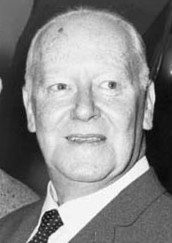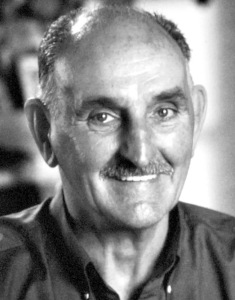
Thomas Kinsella was an Irish poet, translator, editor, and publisher. Born outside Dublin, Kinsella attended University College Dublin before entering the civil service. He began publishing poetry in the early 1950s and, around the same time, translated early Irish poetry into English. In the 1960s, he moved to the United States to teach English at universities including Temple University. Kinsella continued to publish steadily until the 2010s.
John Kinsella is an Australian poet, novelist, critic, essayist and editor. His writing is strongly influenced by landscape, and he espouses an "international regionalism" in his approach to place. He has also frequently worked in collaboration with other writers, artists and musicians.

Kenneth Adolphe Slessor was an Australian poet, journalist and official war correspondent in World War II. He was one of Australia's leading poets, notable particularly for the absorption of modernist influences into Australian poetry. The Kenneth Slessor Prize for Poetry is named after him.

A threnody is a wailing ode, song, hymn or poem of mourning composed or performed as a memorial to a dead person. The term originates from the Greek word θρηνῳδία (threnoidia), from θρῆνος and ᾠδή, the latter ultimately from the Proto-Indo-European root *h₂weyd- that is also the precursor of such words as "ode", "tragedy", "comedy", "parody", "melody" and "rhapsody".

Donald Bruce Dawe was an Australian poet and academic. Some critics consider him one of the most influential Australian poets of all time.

Kwame Senu Neville Dawes is a Ghanaian poet, actor, editor, critic, musician, and former Louis Frye Scudder Professor of Liberal Arts at the University of South Carolina. He is now Professor of English at the University of Nebraska-Lincoln and editor-in-chief at Prairie Schooner magazine.

Leslie Allan Murray was an Australian poet, anthologist and critic. His career spanned over 40 years and he published nearly 30 volumes of poetry as well as two verse novels and collections of his prose writings.
Nationality words link to articles with information on the nation's poetry or literature.
David McCooey, poet, critic, musician, and academic. He is Personal Chair in Literary Studies and Professional & Creative Writing at Deakin University in Geelong.
The Penguin Book of Modern Australian Poetry is a major anthology of twentieth century Australian poetry. Edited by poets Philip Mead and John Tranter it was published by Penguin Australia in 1991. Aside from the usual criticisms any such anthology will produce, it raised some eyebrows at the time for its inclusion of all the Ern Malley hoax poems. It might be claimed there is no accepted canon of contemporary Australian poetry and this book is the selection of its editors.

The New Oxford Book of Australian Verse is a major anthology of Australian poetry edited by the poet Les Murray. It was first published in 1986 and since has been expanded twice.
"Weapons Training" is a piece of war poetry written by Bruce Dawe in 1970. A dramatic monologue spoken by a battle-hardened drill sergeant training recruits about to be sent off to the Vietnam War, its anti-war sentiment is evident but more oblique than in Dawe's other well-known war poem, "Homecoming", written two years earlier.
Ecopoetry is any poetry with a strong ecological or environmental emphasis or message. Many poets and poems in the past have expressed ecological concerns, but only recently has there been an established term to describe them; there is now, in English-speaking poetry, a recognisable subgenre of poetry, termed Ecopoetry, which can, on occasions, form a major strand of a writer's career, preoccupy entire poetry collections, or be the theme of international competitions. Prior to the term, work embodying what we would now instantly recognise as 'an ecological message' had no agreed banner to fly under, but nevertheless the increasing presence of work having an 'ecopoetic' stance exerted an influence on, and gave impetus to, the subsequent subgenre. Examples of influential texts include: the book Ecopoemas of Nicanor Parra (1982); The White Poem by Jay Ramsay & Carole Bruce ; Bosco ; and Heavy Water: a poem for Chernobyl . Other early publications include The Green Book of Poetry by Ivo Mosley. This included over three hundred poems from around the world, many translated by Mosley, and helped to define and establish the genre.

Sarah Holland-Batt is a contemporary Australian poet, critic, and academic.
Dennis Haskell is an Australian poet, critic and academic. He has authored nine collections of poetry, with his most recent works being And Yet… and Ahead of Us. Additionally, Haskell has contributed to literary scholarship, publishing fourteen volumes of literary criticism and literary essays.
"Five Bells" (1939) is a meditative poem by Australian poet Kenneth Slessor. It was originally published as the title poem in the author's collection Five Bells : XX Poems, and later appeared in numerous poetry anthologies. A 2017 study of Australian national poetry anthologies ranked "Five Bells" as the most anthologised poem, appearing in all except one anthology published between 1946 and 2011.
This article presents a list of the historical events and publications of Australian literature during 1968.
The Tomb of Lt. John Learmonth, AIF is a poem by Australian poet J. S. Manifold. It was first published in New Republic magazine on 10 September 1945, and later in the poet's poetry collections Collected Verse (1978), and On My Selection : Poems (1983). The poem has subsequently been published numerous times in various Australian poetry anthologies.
Stephen Kenneth Kelen, known as S. K. Kelen, is an Australian poet and educator. S. K. Kelen began publishing poetry in 1973, when he won a Poetry Australia contest for young poets and several of his poems were published in that journal.
"Beach Burial" (1944) is a poem by Australian poet Kenneth Slessor.